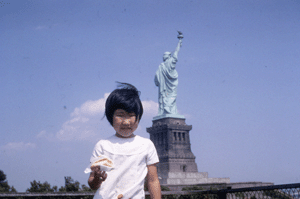
|
MY AMERICA (OR HONK IF YOU LOVE BUDDHA)
 Photo credit: Calvin Tajima Genre: Documentary Ethnicity: General Asian American Themes: Cultural Encounter & Misunderstanding, Gender and Sexuality, History, Identity/Representation Date: 1997 Running Time: 87 min. Director: Renee Tajima-Peña Producers: Renee Tajima-Peña and Quynh Thai Availability: Sai Communications 22D Hollywood Ave Hohokus, NJ 07423 Phone: 800.343.5540 E-mail: myamerica1@aol.com Colleges/Institutions: $295 Public libraries/Non-Profit: $99 |
In My America Renee Tajima-Peña (Who Killed Vincent Chin?) recalls her childhood, back in the days when her vacationing family crossed five state lines without ever seeing another Asian face. Tajima-Peña hits the road again to explore just how much the racial and cultural landscape of America has changed. Driving coast-to-coast and stopping in New York and San Francisco’s Chinatowns but also in Duluth, Minnesota, New Orleans, and Arkansas, she seeks out what it means to be Asian American in our rapidly-changing society. The film chronicles an eclectic group of offbeat and distinctive people — from Chinese American debutantes and eighth generation Filipinos in New Orleans to the entrepreneur Chung Y. Choi with his fortune cookie factory, fish business, and security job, and Cambodian telehuckster Tom Vu. Tajima-Peña also explores the challenge for Asian Americans now that they are no longer "the invisible minority."
Best Cinematography Award, Sundance Film Festival (1997)
Harris, Lyle V. "Ethnic road trip takes comic turns." Atlanta Constitution. June 9, 1998.
Koch, John. "‘My America’ takes satire on the road." Boston Globe. May 6, 1998.
Inoue, Todd S. "Apple Pie and Musubi: Director Renee Tajima Pena and ‘My America.’" Metro Active. February 4, 1998.
http://www.metroactive.com/papers/metro/01.29.98/cinequest2-9804.html
Lim, Dennis. "On the map." Village Voice. July 22, 1997.
Morrison, Patt. "A Journey into Asian America." Los Angeles Times. November 9, 1997.
Thomas, Kevin. "Movie Review; A Wry Toast to Those Seeking an Identity." Los Angeles Times. September 26, 1997.
Wang, Oliver. "On the Road Again." AsianWeek. July 18, 1997.
http://www.asianweek.com/071897/Arts.html
1. Towards the beginning of the film, Victor Wong comments on how "as an Asian American, [he] had to write his own manual on how to live in this country". He mentions reading about the Romans, King Arthur, and Shakespeare in school. Think about your own elementary or secondary school experience. What does multiculturalism in education mean? What is the role of education in the formation of identity? Does this have implications for some of the impetus behind the struggle for Ethnic Studies in schools?
2. Tajima-Pena jokingly talks about the "supergene" theory of why Asians are successful immigrants, how they work harder and can delay gratification. Throughout the film, how is the "model minority" image explored, and in different ways, subverted?
3. In the film, the Bertanog sisters in Louisiana discuss their views of race — how they consider themselves "Americans first, Southerners second," and how Filipinos were always considered "white". What does this say about the black-white racial dichotomy, and how Asians fit or don’t fit into that binary?
4. Mrs. Yang, a Hmong tribeswoman who fled to the US, recalled an incident in which people threw stones at her, yelling, "Chinese, go back!" In what ways have Asians been racially essentialized, and why do you think this is? Does it come from the recent history of wars fought by the US in Korea and Vietnam, or from economic struggles and resentment towards immigrant labor, or something else altogether?
See also:
Lecture notes and discussion questions for 1/17 from the syllabus for "Asian American History, 1850-Present" (Prof. Erika Lee, University of Minnesota)
http://www.hist.umn.edu/~erikalee/aahistlectures.html
Best Cinematography Award, Sundance Film Festival (1997)
Harris, Lyle V. "Ethnic road trip takes comic turns." Atlanta Constitution. June 9, 1998.
Koch, John. "‘My America’ takes satire on the road." Boston Globe. May 6, 1998.
Inoue, Todd S. "Apple Pie and Musubi: Director Renee Tajima Pena and ‘My America.’" Metro Active. February 4, 1998.
http://www.metroactive.com/papers/metro/01.29.98/cinequest2-9804.html
Lim, Dennis. "On the map." Village Voice. July 22, 1997.
Morrison, Patt. "A Journey into Asian America." Los Angeles Times. November 9, 1997.
Thomas, Kevin. "Movie Review; A Wry Toast to Those Seeking an Identity." Los Angeles Times. September 26, 1997.
Wang, Oliver. "On the Road Again." AsianWeek. July 18, 1997.
http://www.asianweek.com/071897/Arts.html
1. Towards the beginning of the film, Victor Wong comments on how "as an Asian American, [he] had to write his own manual on how to live in this country". He mentions reading about the Romans, King Arthur, and Shakespeare in school. Think about your own elementary or secondary school experience. What does multiculturalism in education mean? What is the role of education in the formation of identity? Does this have implications for some of the impetus behind the struggle for Ethnic Studies in schools?
2. Tajima-Pena jokingly talks about the "supergene" theory of why Asians are successful immigrants, how they work harder and can delay gratification. Throughout the film, how is the "model minority" image explored, and in different ways, subverted?
3. In the film, the Bertanog sisters in Louisiana discuss their views of race — how they consider themselves "Americans first, Southerners second," and how Filipinos were always considered "white". What does this say about the black-white racial dichotomy, and how Asians fit or don’t fit into that binary?
4. Mrs. Yang, a Hmong tribeswoman who fled to the US, recalled an incident in which people threw stones at her, yelling, "Chinese, go back!" In what ways have Asians been racially essentialized, and why do you think this is? Does it come from the recent history of wars fought by the US in Korea and Vietnam, or from economic struggles and resentment towards immigrant labor, or something else altogether?
See also:
Lecture notes and discussion questions for 1/17 from the syllabus for "Asian American History, 1850-Present" (Prof. Erika Lee, University of Minnesota)
http://www.hist.umn.edu/~erikalee/aahistlectures.html